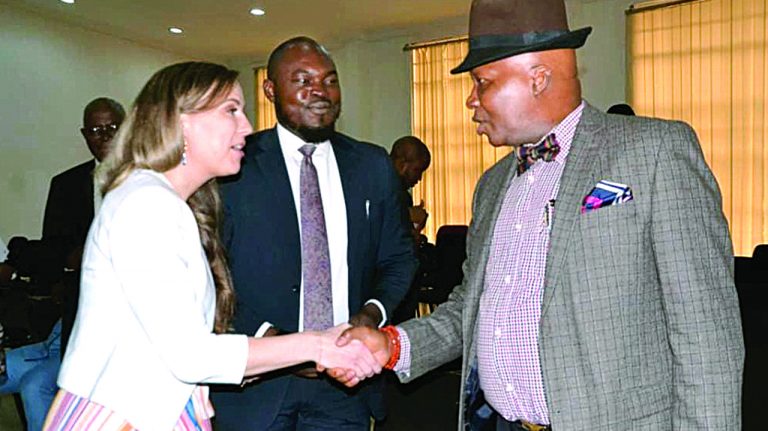• ‘Strange white powder may be anthrax, other toxic agents’
• We’re verifying substance, says embassy staff member
Visitors at the United States Consulate, Victoria Island, Lagos, were compelled to vacate the main building yesterday following a security threat.
The evacuation, which happened at about 12.20 p.m., was the climax of repeated radio warnings that began a few minutes earlier.
Armed and unarmed security operatives immediately took strategic positions within the premises.
Visa applicants and a group of teenagers who had come for an education programme, were among persons ushered out of the building on account of the development.
After about a 40-minute wait at an open space in the premises, Mr. Russell Brooks, the consulate’s public affairs officer, explained to the puzzled evacuees that the order was prompted by the discovery of a parcel containing a white powdery substance.
“We are going to find out what that substance is. They isolated that package and they are attempting to verify what the substance is,” said Brooks.
“For those of you who do not have anything in the building, it is probably best for you to leave because this could be very time-consuming. For those of you who have something still inside, you basically have to stay out in the open here because you cannot go inside now. For those of you who do not have anything inside, feel free to leave.”
The U.S. Embassy in Abuja was temporarily closed down in August last year following a similar incident. In October 2012, the U.S. Embassy in Stockholm, Sweden, was similarly evacuated after a suspicious powder was found in a letter.
Asked why a ‘white powdery substance’ could prompt such alarm, consultant epidemiologist and virologist, Prof. Oyewale Tomori, said: “It can be anything. You need to take it to the laboratory to be sure. It could be anything from anthrax to other poisonous and toxic agents. The immediate thing that comes to my mind is anthrax. It could be so many other things. There is a need to be concerned and get to the laboratory as soon as possible.”
Tomori, a former Vice-Chancellor of Redeemer’s University, Nigeria, is a Fellow of the Royal College of Pathologists of the United Kingdom and has been Regional Virologist for the World Health Organisation Africa Region (1994-2004).
READ ALSO: Xenophobia: Burna Boy Must Apologise —S.A. Rapper, AKA
Anthrax, a potentially fatal infection, is a virulent and highly contagious disease caused by toxigenic spore-forming bacteria, bacillus anthracis.
According to the United States Centre for Disease Control (CDC), if a bio-terrorist attack were to happen, bacillus anthracis would be one of the biological agents most likely to be used.
This is because anthrax can be released without anyone knowing. The microscopic spores could be put into powders, sprays, food and water.
Anthrax has been used in bioterrorism and warfare since World War I. In October 2001, terrorists carried out an anthrax attack via letters delivered by the U.S. Postal Service.
Letters containing anthrax spores were mailed to several news media offices and two senators (Tom Daschle and Patrick Leahy), killing five people and infecting 17 others.
Before the scare, the consulate had been hosting the Health Journalism Seminar, themed: ‘Working Together to Create Nigerian Solutions to Nigerian Challenges.’
Other facilitators at the event, besides Brooks, were: Communications Specialist, CDC Nigeria, Usman Halilu; United States Agency for International Development (USAID) Supervisory Development Outreach & Communications Specialist, Mr. Zack Taylor; and Country Director, U.S. Army Medical Research Directorate, Walter Reed, Ms. Laura R. Chittenden.
The facilitators noted that the U.S. government does not give direct funding to agencies and governments in Nigeria because it believes non-governmental organisations (NGOs) fare better in utilisation and accountability.
They also disclosed that Nigeria is not part of the countries that received cuts in HIV funding as suggested by President Donald Trump.
Taylor said the U.S. government has invested ₦305.586 billion ($846.5m) in health programmes in Nigeria since 2015 and about 800,000 of the 1.2 million people with HIV receiving free treatment are funded by the American people.
He said the USAID in 2018 tested over two million people for HIV and of the 69,000 identified as positive, nearly 55,000 began treatment.
“USAID also provides more than 285,000 HIV positive Nigerians with life-saving therapy and continues to supply Nigeria with HIV test kits and medicines as part of the US government HIV/AIDS response. USAID also provides care and support for more than half a million children orphaned or otherwise affected by HIV.”










